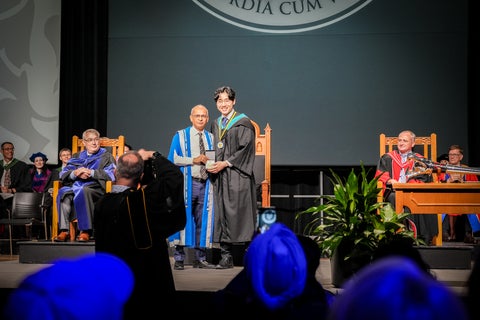
Anthony Dang wins the Alumni Gold Medal
Following his interest leads Biochemistry Co-op graduate to academic excellence
By Vanessa Parks
Internal Communications and Engagement Specialist

Anthony Dang, this year’s Alumni Gold Medal winner, is finishing his undergraduate degree on a high note. The Alumni Gold Medal recognizes the academic achievement of graduating students in each of the six faculties at Waterloo. Anthony is a graduate of the Biochemistry Co-op program and this year’s Science recipient.
“My undergrad experience has been everything I could have asked for it to be in terms of what I learned through my classes, the interests and skills I've been able to hone through my co-ops, and all the incredible people I've met,” Anthony says. “All of these things are represented through this award.”
In Anthony’s experience, you don’t immediately need a clear picture of where you’re going to end up before you get started. Anthony came to Waterloo with a broad interest in biology and chemistry, and things grew from there. “I took what I knew about bio and chem and funnelled that into a more specific interest in proteins,” Anthony says. “And that was just the start.”
He didn’t think much beyond his love of protein work at first. “It was a running joke that every time I told people I liked protein research, they would ask, ‘Okay, but what for?’ and I couldn’t really answer,” he says. But that changed quickly as he found his place at Waterloo.
In his first year, he joined Waterloo iGEM, a student synthetic biology design team, where he met friends who introduced him to Dr. Dale Martin and his neurodegeneration research. It was there that Anthony found the broader context for his passion.
During a co-op term in Dr. Martin’s NeurdyPhagy Lab, co-supervised by Dr. Bernard Duncker, Anthony helped create CRISPR-Cas9 palmitoylation mutants of a DNA damage repair protein. He continued with Dr. Martin to explore the toxicity of proteins implicated in a degenerative disease called multisystem proteinopathy. This work culminated in his Honours Thesis project for which he developed a drug screen for this disease.
This summer, Anthony is wrapping up this drug screen research and tackling a new project with the support of the Huntington Society Canada and Brain Canada Foundation 2024 Undergraduate Summer Student Fellowship. He is one of only seven recipients across Canada of this 12-week fellowship which funds research into treatments for Huntington disease. “We’ve found a drug with potential in being repurposed,” Anthony says. “I will be employing computational methods to optimize this drug as a therapeutic for Huntington disease.”
After his fellowship, Anthony is planning to take a gap year before he applies to graduate school. He hopes to apply his research skills in academia or industry. “Through my experiences in the lab, I learned that I was passionate about neuroscience as well as drug discovery and design,” Anthony says. “I realized that I want to explore both as I continue into graduate studies and beyond.”
Anthony’s advice to incoming students is simple. “Get involved, and get involved early,” he says. “You never know where it will lead you.”